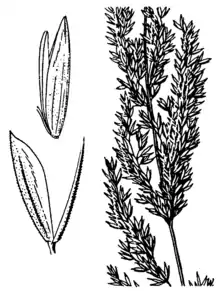Sphenopholis intermedia
Sphenopholis intermedia, the slender wedgegrass or slender wedgescale,[2] is an annual grass native to North America. The specific epithet "intermedia" means "intermediate". The diploid number is 14.
| Sphenopholis intermedia | |
|---|---|
 | |
| Illustration of flowering head and florets[1] | |
| Scientific classification | |
| Kingdom: | Plantae |
| Clade: | Tracheophytes |
| Clade: | Angiosperms |
| Clade: | Monocots |
| Clade: | Commelinids |
| Order: | Poales |
| Family: | Poaceae |
| Subfamily: | Pooideae |
| Genus: | Sphenopholis |
| Species: | S. intermedia |
| Binomial name | |
| Sphenopholis intermedia | |
Description
Sphenopholis intermedia is a slender grass growing 20–120 cm (8–47 in) tall. The leaf sheaths can be pubescent or glabrous. The ligules are 1.5–2.5 mm (0.06–0.10 in) and often appear erose-ciliate and lacerate. The upper leaf blades are half as long or as long as their sheaths and are scabrous on their nerves. Most leaf blades are 2–6 mm (0.08–0.24 in) broad and flat or slightly rolled.[3][4][5]
The lax panicles are 3–20 cm (1.2–7.9 in) long and tend to nod. The spikelets are 3–4.2 mm (0.12–0.17 in) long. The glumes are scabrous on their keels, with the first linear-attenuate and the second oblanceolate. The lemmas are lanceolate and are glabrous except for the most distal lemmas, which become scabrous at their ends. The anthers are 0.5 mm (0.02 in) long. The paleas are thin, narrow, and slightly shorter than the lemmas.[3][4][5]
S. intermedia flowers from June into August.[3]
Distribution and habitat
Sphenopholis intermedia occurs in meadows, prairies, shores, and damp slopes at elevations between sea level and 2,500 m (8,200 ft). It prefers wet soils, damp soils that dry after growing season, and clay soils with high water retention.[4] It can be found from Newfoundland to southern Alaska, extending south to Florida, Louisiana, Colorado, and Arizona.[3][6]
References
- Hitchcock, A.S. (rev. A. Chase). 1950. Manual of the grasses of the United States. USDA Miscellaneous Publication No. 200. Washington, DC. 1950
- "Sphenopholis intermedia". Natural Resources Conservation Service PLANTS Database. USDA. Retrieved 6 December 2020.
- Merrit Lyndon Fernald (1970). R. C. Rollins (ed.). Gray's Manual of Botany (Eighth (Centennial) - Illustrated ed.). D. Van Nostrand Company. p. 144. ISBN 0-442-22250-5.
- Barkworth, M.E. and Capels, K.M. and Long, S. (1993). Flora of North America, North of Mexico. Flora of North America. 24. Oxford University Press. p. 623. ISBN 9780195310719.CS1 maint: multiple names: authors list (link)
- New York Botanical Garden and Biodiversity Heritage Library (1909). North American Flora. 17. New York Botanical Garden. p. 546.
- Haines, A. and Farnsworth, E.J. and Morrison, G. (2011). New England Wild Flower Society's Flora Novae Angliae: A Manual for the Identification of Native and Naturalized Higher Vascular Plants of New England. Yale University Press. p. 283. ISBN 9780300171549.CS1 maint: multiple names: authors list (link)